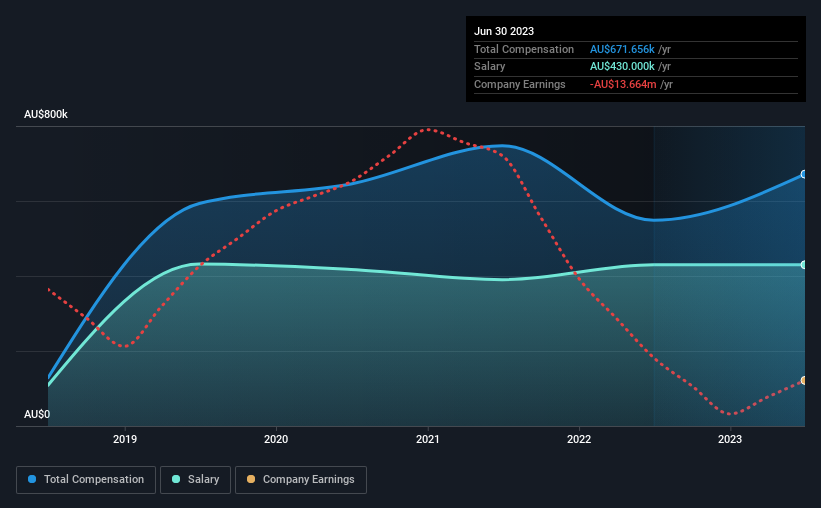We Think Shareholders Are Less Likely To Approve A Large Pay Rise For RedFlow Limited's (ASX:RFX) CEO For Now
Key Insights
RedFlow will host its Annual General Meeting on 23rd of November
Salary of AU$430.0k is part of CEO Tim Harris's total remuneration
The total compensation is 74% higher than the average for the industry
RedFlow's three-year loss to shareholders was 29% while its EPS grew by 4.0% over the past three years
Shareholders of RedFlow Limited (ASX:RFX) will have been dismayed by the negative share price return over the last three years. What is concerning is that despite positive EPS growth, the share price has not tracked the trend in fundamentals. The AGM coming up on the 23rd of November could be an opportunity for shareholders to bring these concerns to the board's attention. Voting on resolutions such as executive remuneration and other matters could also be a way to influence management. We think shareholders might be reluctant to increase compensation for the CEO at the moment, according to our analysis below.
Check out our latest analysis for RedFlow
Comparing RedFlow Limited's CEO Compensation With The Industry
According to our data, RedFlow Limited has a market capitalization of AU$47m, and paid its CEO total annual compensation worth AU$672k over the year to June 2023. Notably, that's an increase of 22% over the year before. Notably, the salary which is AU$430.0k, represents most of the total compensation being paid.
For comparison, other companies in the Australia Electrical industry with market capitalizations below AU$307m, reported a median total CEO compensation of AU$385k. This suggests that Tim Harris is paid more than the median for the industry. Moreover, Tim Harris also holds AU$277k worth of RedFlow stock directly under their own name.
Component | 2023 | 2022 | Proportion (2023) |
Salary | AU$430k | AU$430k | 64% |
Other | AU$242k | AU$119k | 36% |
Total Compensation | AU$672k | AU$549k | 100% |
On an industry level, roughly 72% of total compensation represents salary and 28% is other remuneration. In RedFlow's case, non-salary compensation represents a greater slice of total remuneration, in comparison to the broader industry. If salary dominates total compensation, it suggests that CEO compensation is leaning less towards the variable component, which is usually linked with performance.
RedFlow Limited's Growth
RedFlow Limited's earnings per share (EPS) grew 4.0% per year over the last three years. It saw its revenue drop 24% over the last year.
We would prefer it if there was revenue growth, but the modest improvement in EPS is good. These two metrics are moving in different directions, so while it's hard to be confident judging performance, we think the stock is worth watching. We don't have analyst forecasts, but you could get a better understanding of its growth by checking out this more detailed historical graph of earnings, revenue and cash flow.
Has RedFlow Limited Been A Good Investment?
Since shareholders would have lost about 29% over three years, some RedFlow Limited investors would surely be feeling negative emotions. So shareholders would probably want the company to be less generous with CEO compensation.
To Conclude...
The fact that shareholders are sitting on a loss on the value of their shares in the past few years is certainly disconcerting. A huge lag in share price growth when earnings have grown may indicate there could be other issues that are affecting the company at the moment that the market is focused on. If there are some unknown variables that are influencing the stock's price, surely shareholders would have some concerns. At the upcoming AGM, shareholders will get the opportunity to discuss any issues with the board, including those related to CEO remuneration and assess if the board's plan will likely improve performance in the future.
CEO compensation is an important area to keep your eyes on, but we've also need to pay attention to other attributes of the company. We did our research and identified 5 warning signs (and 3 which are a bit concerning) in RedFlow we think you should know about.
Switching gears from RedFlow, if you're hunting for a pristine balance sheet and premium returns, this free list of high return, low debt companies is a great place to look.
Have feedback on this article? Concerned about the content? Get in touch with us directly. Alternatively, email editorial-team (at) simplywallst.com.
This article by Simply Wall St is general in nature. We provide commentary based on historical data and analyst forecasts only using an unbiased methodology and our articles are not intended to be financial advice. It does not constitute a recommendation to buy or sell any stock, and does not take account of your objectives, or your financial situation. We aim to bring you long-term focused analysis driven by fundamental data. Note that our analysis may not factor in the latest price-sensitive company announcements or qualitative material. Simply Wall St has no position in any stocks mentioned.

